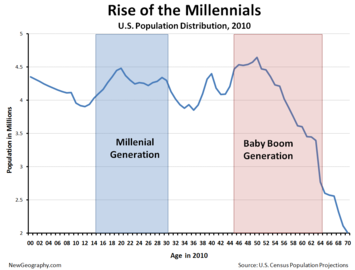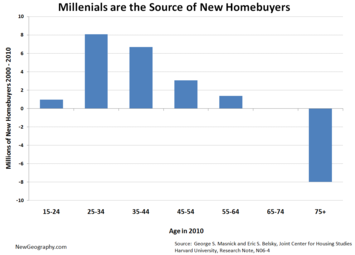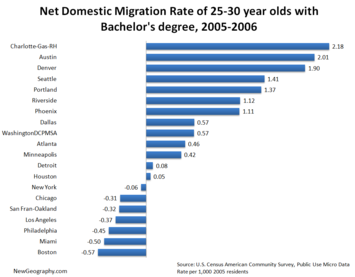
Perhaps nothing will shape the future of the country more than the emergence of the so-called Millennial generation. They have already put their stamp on the election, as Carl Cannon suggests in his insightful article in Reader’s Digest, becoming a key driver for Senator Barack Obama’s Presidential run.
But as Morley Winograd and Michael Hais, authors of the best-selling “Millenial Makeover,” point out, the Millennial generation -- roughly those born between 1983 and 2003 -- represent far more than a rerun of 60s’ generation liberalism. They share as well many traditionalist views about home, family and religion that may impact the nation’s geography and attitudes on everything from race relations to suburbia for decades to come.
Not everyone is thrilled with the current celebration of Millennials. Some, like the insightful Lisa Chamberlain point out that many of the optimistic predictions made for her generation -- the so-called Xers -- turned out to be off target. She maintains that powerful outside influences, such as high energy prices, may constrain the normative optimism widely identified with the Millennials.
 But however they might turn out, one thing is certain: by the sheer weight of numbers the Millennials will shape the nation in profound ways. By 2010 this generation will be entering adulthood and will equal or surpass the boomers. They will become the new force in the housing market, forming the base for a new wave of homeowners.
But however they might turn out, one thing is certain: by the sheer weight of numbers the Millennials will shape the nation in profound ways. By 2010 this generation will be entering adulthood and will equal or surpass the boomers. They will become the new force in the housing market, forming the base for a new wave of homeowners.
Although it is far too early to predict where they will settle, authors Winograd and Hais argue, the first groups of older Millennials appear to be following their predecessors to the suburbs. They point out that this group values homeownership even more than earlier generations, seems more amenable to living near their parents and have expressed strong interest in raising children.
 Of course, other factors, as Lisa Chamberlain argues, could force the Millennials to live more in dense urban areas. The imposition of draconian planning regimes -- in part based on the idea that suburbs promote global warming -- could leave them with little other choice. And finally land prices could force suburban developers to densify and all but eliminate the single-family residence.
Of course, other factors, as Lisa Chamberlain argues, could force the Millennials to live more in dense urban areas. The imposition of draconian planning regimes -- in part based on the idea that suburbs promote global warming -- could leave them with little other choice. And finally land prices could force suburban developers to densify and all but eliminate the single-family residence.
 But history suggests none of this is likely. People will locate in those areas that provide quality of life, affordable housing and economic opportunity. Our snapshot of educated Millennials between 25 and 30, which may be considered the vanguard of that generation, shows a preference for the generally affordable Western and Sunbelt regions like Charlotte, Austin, Denver, Portland, Riverside-San Bernardino, Phoenix and Dallas.
But history suggests none of this is likely. People will locate in those areas that provide quality of life, affordable housing and economic opportunity. Our snapshot of educated Millennials between 25 and 30, which may be considered the vanguard of that generation, shows a preference for the generally affordable Western and Sunbelt regions like Charlotte, Austin, Denver, Portland, Riverside-San Bernardino, Phoenix and Dallas.
One place on balance the older Millennials are not going: the big metropolitan areas of California and the Northeast. In 2006, New York, Los Angeles, Chicago, Philadelphia, the San Francisco Bay Area and Boston all lost more educated Millennials than they gained. As the impact of the financial meltdown shifts to these cities, particularly the financial centers, this trend could accelerate, particularly in the New York area.
Yet in the end, predicting the future is a tricky business. In the hippy heyday of 1968 few people would have expected the Boomers to follow their parents into suburbia and, as a group, flock to the banner of Ronald Reagan and become the bulkwark of a great conservative resurgence. That’s why, while it’s always good to tap as much good data as possible, prognostication remains more as an art than a science.
Joel Kotkin is Executive Editor of www.newgeography.com.













Nice to be visiting your
Nice to be visiting your blog once more, it continues to be months for me. Nicely this post that i’ve been waited for so lengthy.
Click This Link
I am very happy to discover
I am very happy to discover your post as it will become on top in my collection of favorite blogs to visit.
Read More
This is such a great
This is such a great resource that you are providing and you give it away for free. I love seeing blog that understand the value of providing a quality resource for free.
Look for K12 Korea Here
Good post but I was
Good post but I was wondering if you could write a litte more on this subject? I’d be very thankful if you could elaborate a little bit further. Appreciate it!
Read More about BJB HYY
As a millenial who is about
As a millenial who is about to graduate from college and relocate to Austin (though I've lived there for a couple of summers), your view that it will be only outside political forces or changing trends in land economics that will make suburbs less desirable misses a bit of the picture in my opinion. The vast majority of recent graduates I know have moved to urban areas. They are likely to move when it comes time to raise children because of poor school systems in urban areas and the high prices of urban real estate. I believe that the first reason will become less of an issue in coming years, and the second reason could be ameliorated with reasonable urban policies.
Urban school systems are low-performing because of a self-reinforcing cycle that has taken place since World War II. The affluent moved out to the suburbs and left the poor behind, and parents are reluctant to send their children to schools that are dominated by those from lower classes. However, as cities revitalize, those poor residents will be gradually pushed out and more affluent city dwellers will be more likely to send their kids to the public schools. As those schools improve, more people will see that it is feasible to raise children in the city, and more young families will resist fleeing to the tried and true suburbs. I think that most people value the amenities of the city more than the space and supposed privacy of the suburbs, but the schools are what make them go for the latter. If I'm correct, I think the much hyped return to cities is extremely likely.
The high prices of urban real estate could be lowered by allowing people to build more housing (up, not out) to accommodate the people who want to live in the city, but surprisingly few cities are willing to do this. Trying to replicate suburban housing patterns in central areas is a recipe for high prices, as can be seen in central Austin.
True that, Natrius
I agree with Natrius. As a "millenial" recently graduated from college, I can say that most of my friends have moved in to the city, despite the fact that we went to a conservative, suburban college. Those that do live in the suburbs tend to live in denser, inner-ring suburbs. This is where you find cheaper, older apartments.
Point #2: We almost all own or rent single-family homes (or apartments in mostly single-family neighborhoods). Maybe Birmingham is unique, but most city neighborhoods are single-family. Any lofts or condos are too new and too expensive for broke kids like us.
Point #3: We all grew up in the suburbs, and most of us are reacting to what we considered a sterile and boring childhood by moving to diverse, urban neighborhoods. People our age grew up completely reliant on our parents because there were no sidewalks in our neighborhoods, and the roads were too dangerous for bicycles. We couldn't go down to the store to buy candy. We couldn't bike to school. Every trip we ever made, no matter how short, involved a minivan. I don't want that for my kids. I want them to have the chance to experience some degree of freedom before they turn 16. I want them to know a diverse group of people. So, I want to raise them in the city.
Point #4: Net migration to both New York and Houston is statistically 0. We can't afford housing in New York, but we wouldn't stand to live in Houston. You can praise it as much as you like, but I'd never live there. Hip cities like Austin, Portland, and Denver are where my friends dream of living although many of us are pretty satisfied here in Birmingham.
In any case, thanks for all the attention today. I think you're wrong about us, and hopefully that will become clear before too long.
millenials
as i said time will tell...so far the trend is not promising as people enter 30s...a lot depends on what happens in cities
when i was in my 20s all my friends felt as you do, but over time things happen. the key is how cities change -- will they be more business friendly, will they reform schools and deal with their enormous pension overhang.
as for Houston, it does very well when we measure 28-50 with college educated migration. we plan to do an issue on raising children in cities which by the way i am doing(if you consider la a city)...it is very difficult and expensive.
finally suburbs are changing. they are certainly more diverse than they were --- i also see some 30 somethings moving to certain smaller cities and towns.
20 somethings change--- the boomer changed. i imagine millenials will as well and cities can capture them only by changing their fundamentals.
thank you for your comments
joel kotkin